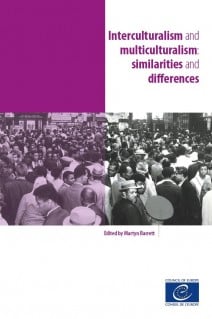



This book examines the relationship between two policy approaches for managing the cultural diversity of contemporary societies: interculturalism and multiculturalism.
The relationship between these two approaches has been a matter of intense debate in recent years. Some commentators argue that they represent two very di fferent approaches, while others argue that interculturalism merely re-emphasises some of the core elements of present day multiculturalism. The debate arises, in part, because multiculturalism can take a variety of di fferent forms, which makes it di fficult to identify its key features in order to compare it with interculturalism. The debate has gained added momentum from the backlash against multiculturalism in recent years, and from the Council of Europe’s prominent championing of interculturalism as an alternative approach.
This book aims to clarify the concepts of interculturalism and multiculturalism, and to bring the various arguments together in a way that will assist politicians, policy makers, practitioners and interested lay people to understand the concerns that are driving the di fferent orientations. The book is also intended to facilitate a comparison of the policy implications of interculturalism and multiculturalism. To this end, each chapter concludes with a concise statement of the implications for policy that follow from the viewpoint that has been expressed.
Acknowledgements
Notes on the contributors
Foreword
Ólöf Ólafsdóttir
1 – Introduction – Interculturalism and multiculturalism: concepts and controversies
Martyn Barrett
2 – The intercultural milestone: the history of the Council of Europe’s White Paper on intercultural dialogue
Ulrich Bunjes
3 – The urgency of intercultural dialogue in a Europe of insecurity
Robin Wilson
4 – Interculturalism as a new narrative for the era of globalisation and super-diversity
Ted Cantle
5 – Interculturalism: what makes it distinctive?
Gérard Bouchard
6 – Interacting interculturalism with multiculturalism: observations on theory and practice
Nasar Meer and Tariq Modood
7 – Interculturalism, multiculturalism and language issues and policies
Maria del Carmen Méndez García and Michael Byram
8 – Intercultural competence: a distinctive hallmark of interculturalism?
Martyn Barrett
9 – Educational challenges and perspectives in multiculturalism vs. interculturalism: citizenship education for intercultural realities
Léonce Bekemans

This book examines the relationship between two policy approaches for managing the cultural diversity of contemporary societies: interculturalism and multiculturalism.
The relationship between these two approaches has been a matter of intense debate in recent years. Some commentators argue that they represent two very di fferent approaches, while others argue that interculturalism merely re-emphasises some of the core elements of present day multiculturalism. The debate arises, in part, because multiculturalism can take a variety of di fferent forms, which makes it di fficult to identify its key features in order to compare it with interculturalism. The debate has gained added momentum from the backlash against multiculturalism in recent years, and from the Council of Europe’s prominent championing of interculturalism as an alternative approach.
This book aims to clarify the concepts of interculturalism and multiculturalism, and to bring the various arguments together in a way that will assist politicians, policy makers, practitioners and interested lay people to understand the concerns that are driving the di fferent orientations. The book is also intended to facilitate a comparison of the policy implications of interculturalism and multiculturalism. To this end, each chapter concludes with a concise statement of the implications for policy that follow from the viewpoint that has been expressed.
Attention, en vertu de nos conditions générales de vente, l'achat des PDF/epub est réservé aux particuliers.
